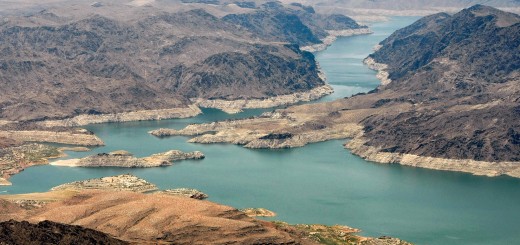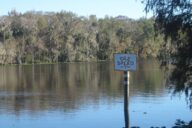Despite Duskytail Darter Return, Lake Cumberland Levels to Rise
0In a move surprising to some, the U.S. Army Corps of Engineers will raise levels at Kentucky’s Lake Cumberland. The move is in spite of a transition by the duskytail darter, one of the state’s rarest fish species, back into parts of its old habitat – some five miles of tributary waters nearby.

Duskytail darter, Etheostoma percnurum. (Credit: Dick Biggins, U.S. Fish and Wildlife Service)
Raising levels in Lake Cumberland will predictably lower levels in those tributaries, reducing the area endangered duskytail darters now inhabit. But with political leaders arguing for more water to help tourism, agencies involved with the decision were under considerable pressure.
These leaders include U.S. Senators Mitch McConnell and Rand Paul, Kentucky Governor Steve Beshear, and a number of representatives from surrounding states.

Lake Cumberland. (Credit: Tyler White via Wikimedia Commons)
So a middle ground has been struck between the economic value of a higher Lake Cumberland and the duskytail darter’s survival. The U.S. Fish and Wildlife Service, which halted the refill by following a mandatory review of the darter’s status, and the U.S. Army Corps of Engineers, in charge of the dam on Lake Cumberland, will take on three conservation measures:
-
capture duskytail darters to establish a population for future recovery efforts;
-
adjust the winter and spring filling cycles of Lake Cumberland to reach levels before repairs to the lake’s dam began;
-
and stop mine drainage going into tributaries of the Big South Fork River to maintain the habitat’s viability.

Wolf Creek Dam and Lake Cumberland, April 2007. (Credit: Wikipedia User Censusdata via Wikimedia Commons)
Reactions to the decision are predictably mixed.
Lee Andrews, a field office supervisor with the U.S. Fish and Wildlife Service says it’s a good example of how needs of the Endangered Species Act can be balanced with economic needs of a region.
Politicians are pleased, joining in a statement to commend it: “we appreciate the Secretary of the Interior making an expedited, 45-day decision for their Biological Opinion, which prompted the Corps to sign the order today allowing water levels to be restored to 723 feet – levels adequate to support robust tourism in 2014.”
Alicia Howell, who is a board member of the Sierra Club’s Kentucky Chapter, said politicians should have let agencies “follow the best science.”
For the duskytail darter, only time will tell if they did.













